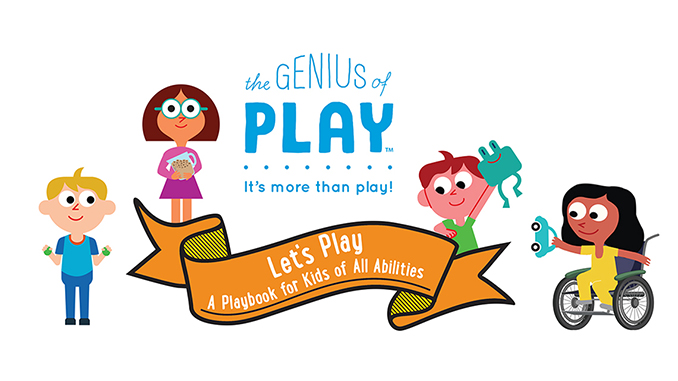
The Genius of Play™ supports Developmental Disabilities Awareness Month with the launch of “Let’s Play – A Playbook for All Abilities.”
Published: March 7, 2024
The Genius of Play™, a national movement spearheaded by The Toy Association™ to raise awareness about play’s vital role in child development, recently marked the first day of Developmental Disabilities Awareness Month with the launch of “Let’s Play – A Playbook for All Abilities.”
With nearly two in three U.S. parents1 saying they consider how a toy builds specific skills when picking playthings for their kids, this free guide offers families a variety of adaptive, play-based activities to help children meet developmental milestones and promote social inclusion while having fun.
Developed in partnership with occupational therapist Antonia Llull and her MPOWERME team, and Ellen Metrick, a human factors specialist with UL Solutions, a global safety science leader & product safety testing company, the Playbook features nine play ideas that can be adapted to children’s varying interests and abilities.
“From enhancing hand-eye coordination through vehicle play to encouraging phonological awareness through music-themed games, our digital playbook aims to break down barriers to play by making various skill-building activities accessible to everyone,” says Adrienne Appell, executive vice president of marketing communications at The Toy Association. “Our extensive research has found that play is crucial for children’s cognitive, physical, social, and emotional development. We are proud to offer this inclusive and complimentary resource to help bring play’s incredible benefits to kids of all abilities.”
The Playbook’s simple, yet effective, activities feature step-by-step instructions, as well as “challenge boosters” for each activity to help caregivers target areas where a child might need or want an extra challenge. There are also alternative ways to play depending on physical limitations, developmental disabilities, and family schedules (i.e., adapting the activity to play in the car, during bathtime, etc.).
For example, in the activity “Act It Out,” kids are invited to act out scenes in a story, encouraging them to understand and manage their feelings while stepping into the shoes of various characters. For children who are non-verbal, it can be modified to encourage the use of gestures, facial expressions, props, and Augmentative and Alternative Communication (AAC) devices (i.e., no-, low-, and high-tech devices that include the use of pictures to communicate or generate speech).
“Playfulness is a state of mind that transcends our stresses and fosters a sense of joy and well-being,” says Llull. “In children, it goes further, a playful state of being also drives engagement, development, learning, and a sense of mastery. Our Playbook is a testament to the belief that play knows no bounds. It is inclusive, adaptive, and inherently enriching.”
The Genius of Play’s “Let’s Play – A Playbook for Kids of All Abilities” is free to download online in a digital book format. For more information about The Genius of Play, visit thegeniusofplay.org.
